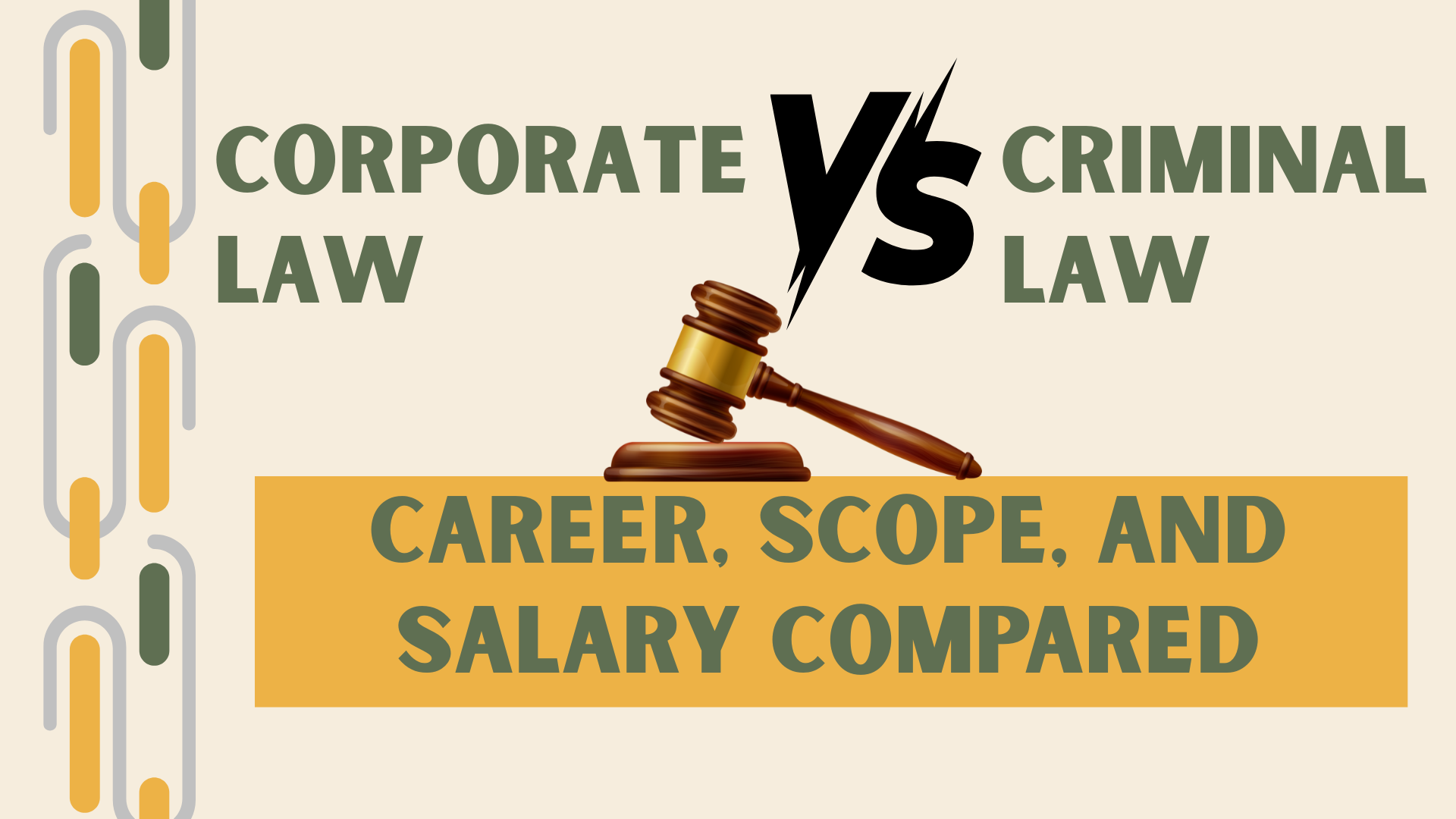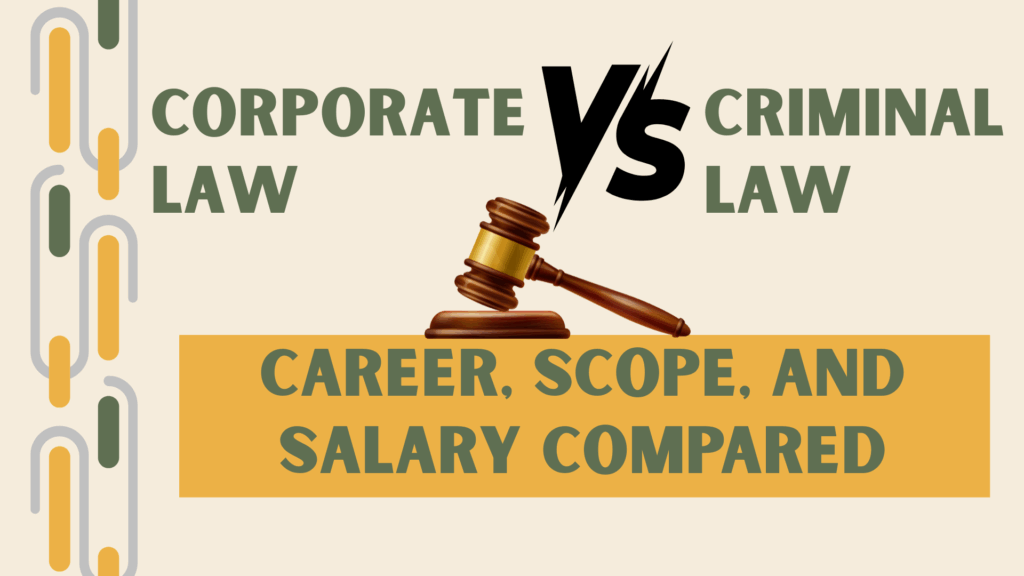In this article we have a vivid comparison of Corporate law vs. Criminal law; read in depth about its Career, Scope, and salary compared.
Comparing Corporate Law with Criminal Law
One of the most important choices for those who want to be attorneys is what area of law they want to specialize in. Corporate law and criminal law are two very different areas of law that separate out from the others. They have different career paths and work settings. Both areas provide fulfilling employment, but they need distinct skills, attract different types of clientele, and pay differently.
This article compares corporate law with criminal law in terms of career routes, employment duties, wage possibilities, necessary credentials, and long-term growth, notably in India. This article will help you make a smart option if you’re attempting to choose between the two.
What is Corporate Law?
Corporate law is the part of the law that deals with business and trade. It covers regulations for forming companies, buying and selling companies, paying taxes, following the rules, protecting intellectual property, contract law, and settling business disputes.

Corporate attorneys work for either their own company or a law firm that works with businesses. Their main job is to give advice and do business.
What is Criminal Law?
Criminal law is the set of rules that deal with crime and punishment. It entails either prosecuting or defending someone who is suspected of breaking the Indian Penal Code or any particular criminal laws.
Criminal attorneys might be public prosecutors, government lawyers, or defense counsel. Criminal law practitioners, on the other hand, spend a lot of time in court and deal with lawsuits on a regular basis.
More Information: Get Here
Career Paths and Roles
Corporate Law:
- In-house lawyers at businesses
- Corporate Law Associate in a law firm
- Legal advisor for mergers, acquisitions, and following the law
- Consultant for banks, fintech companies, and government agencies
- Partner or managing partner in a corporate legal firm
Criminal Law:
- Lawyer for Criminal Defense
- Government Advocate or Public Prosecutor
- Litigator in trial or appellate courts
- Legal Aid Officer in NGOs and organizations that work for human rights
- Judge or Magistrate (with a passing grade on the judicial test)
Skills Needed:
| Corporate Law | Criminal Law |
|---|---|
| Commercial awareness | Strong oratory and courtroom presence |
| Contract drafting & interpretation | In-depth knowledge of IPC and CrPC |
| M&A and compliance knowledge | Investigative skills |
| Negotiation and risk analysis | Emotional intelligence |
| Attention to legal frameworks | Passion for justice and public service |
Estimated Salary Prospects in India 2025
| Experience Level | Corporate Law (per annum) | Criminal Law (per annum) |
|---|---|---|
| Entry-Level (0–2 yrs) | ₹6 – ₹12 LPA | ₹2 – ₹5 LPA (private practice), ₹6 – ₹8 LPA (prosecutor) |
| Mid-Level (3–7 yrs) | ₹15 – ₹25 LPA | ₹8 – ₹12
LPA (established practice) |
| Senior-Level (10+ yrs) | ₹40 LPA+ (partners/in-house) | ₹20 – ₹50 LPA (senior advocates, criminal law experts) |
Corporate Law vs. Criminal Law: Work Environment
Most of the time, corporate law is done in an office with set hours. However, negotiations might have very tight deadlines.
Criminal law means going to court, having strange schedules, and dealing with very sensitive matters. It might involve going to jail and talking to police.
Requirements for Education and Entry
To get either job, you need to have a legal degree (LL.B) from a well-known university. But:
Law for businesses People who want to work in business law typically get more credentials, including an LL.M in Corporate Law or an MBA–Law dual degree.
Law of Crime People who want to become lawyers can get an LL.M. in Criminal Law. They must also pass the AIBE and can choose to take the public prosecutor examinations.
Long-Term Scope:
Corporate Law:
- The corporate and startup environment in India is growing quickly, which means there is a lot of room for development.
- Global mobility and chances to work with MNCs in other countries.
- Profitable partnerships in legal firms, which can lead to yearly payouts worth crores.
Criminal Law:
- Lawyers may take on important public interest matters that have a lot of influence and are well-known.
- There are chances to become a judge, work in the Supreme Court, or get into politics.
- Initial income increase is slower, but it may be significant at higher levels.
Comparing Corporate Law vs. Criminal Law
| Category | Corporate Law | Criminal Law |
|---|---|---|
| Nature of Work | Advisory, contractual, compliance | Litigative, investigatory, courtroom |
| Work Hours | Generally structured | Often irregular and case-dependent |
| Income Stability | High, especially in Tier-1 firms | Variable, depends on clientele & success |
| Career Risks | Low | High in initial years |
| Social Impact | Indirect | Direct and high |
| Ideal For | Business-minded, analytical thinkers | Passionate, justice-driven individuals |
Conclusion
There are many profitable but quite diverse professional possibilities in both business law and criminal law. Corporate law is great for people who like working in organized settings, dealing with corporate issues, and making a lot of money. Criminal law, on the other hand, attracts those who care about justice, advocacy, and making a difference in society.
The ideal path for you relies on your abilities, long-term objectives, and the sort of legal life you want to have. If you want to work in boardrooms and make billion-dollar transactions, corporate law could be for you. But if you like being in court and battling for justice, criminal law is the way to go.
Thanks a lot for reading this post with our portal.





